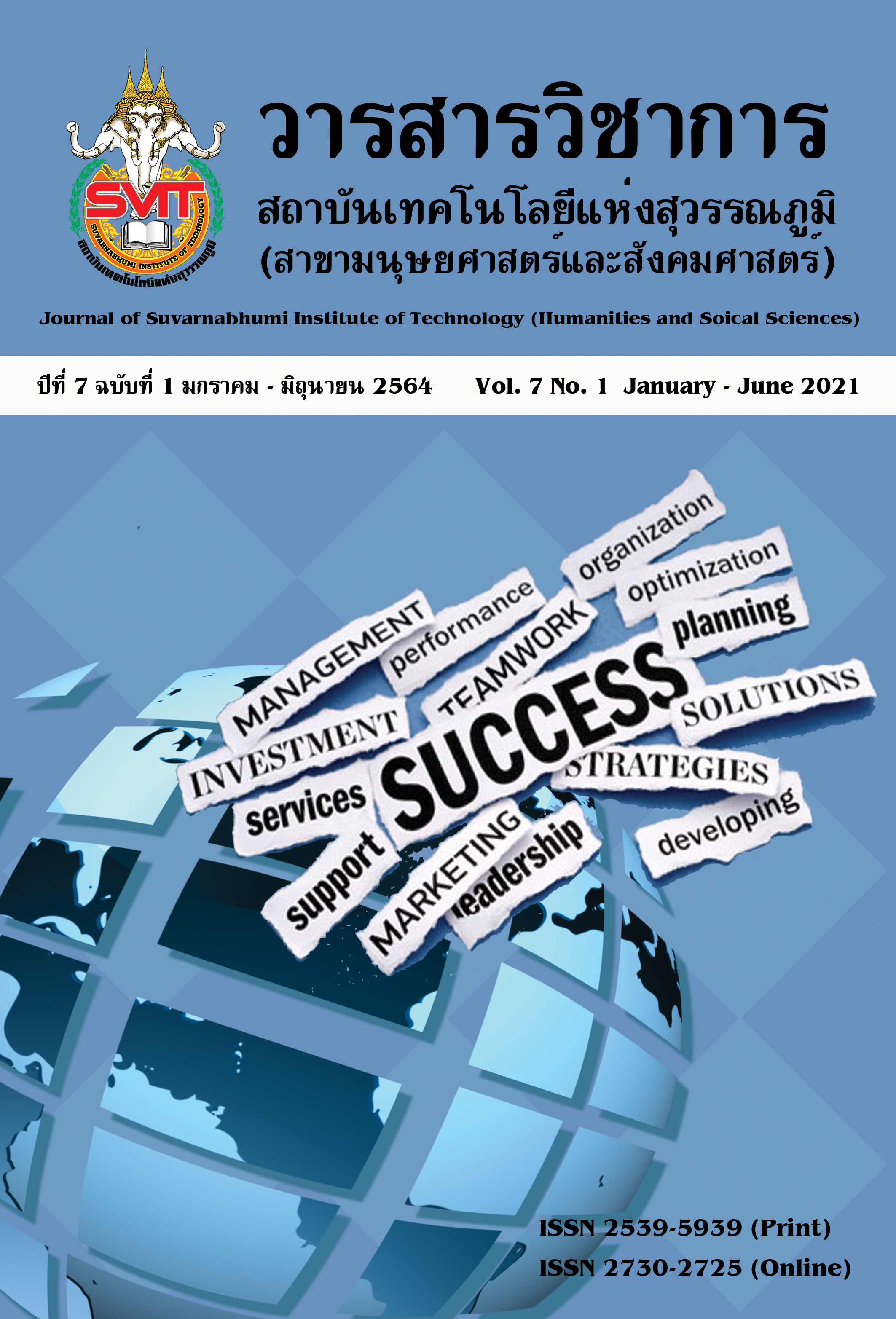ACADEMIC ACHIEVEMENT DEVELOPMENT OF SALES MANAGEMENT COURSE LESSONS USING PROJECT BASED LEARNING THROUGH THE SISA E-LEARNING OF THE FIRST-YEAR STUDENTS IN HIGH VOCATIONAL CERTIFICATE (HIGH VOC.CERT.) IN MARKETING PROGRAM IN BILATERAL SYSTEM, EASTERN TECHNOLOGICAL COLLEGE (E.TECH)
Keywords:
The Development of Learning Achievement, Project Based Learning, SISA e-LearningAbstract
The objectives of this research were 1) to determine the efficiency of Sales Management lessons taught by Project Based Learning through the SISA e-Learning to achieve the efficiency criteria of 80/80, 2) to compare the academic achievement of the first year students in Sales Management Course using Project Based Learning through the SISA e-Learning between pretest and posttest periods, and 3) to study the satisfaction of the first year students towards the instruction of Sales Management by Project Based Learning through the SISA e-Learning. The sample was the first-year students in Marketing Program that obtained less than 24 points of a mid-term score of Sales Management Course under a required criteria at 60 percent of full score of 40 points. The trial was conducted in semester 1, academic year 2020, using 4 sessions of 50 minutes per week, totaling 5 weeks. The research instruments consisted of 1) Sales Management learning management plan by Project Based Learning, 2) Online pretest and posttest, and 3) Student satisfaction questionnaire on Project Based Learning and the SISA e-Learning. Data were analyzed using statistics including mean, standard deviation, and t-test dependent sample.
The results of this research indicated that 1)the efficiency of Sales Management lessons taught by Project Based Learning through the SISA e-Learning met the efficiency criteria was 81.38/82.07 in average base on the standard of 80/80, 2) students taught by Project Based Learning through the SISA e-Learning had higher mean posttest score than mean pretest score with a statistical significance level of .01, and 3) students’ satisfaction with the Sales Management lessons taught by Project Based Learning through the SISA e-Learning the average of 4.44 was at the highest level.
References
ดุษฎี โยเหลา และคณะ. (2557). การศึกษาการจัดการเรียนรู้แบบ PBL ที่ได้จากโครงการสร้างชุดความรู้เพื่อสร้างเสริมทักษะแห่งศตวรรษที่ 21 ของเด็กและเยาวชน: จากประสบการณ์ความสำเร็จของโรงเรียนไทย. กรุงเทพฯ: ทิพยวิสุทธิ์.
ทิศนา แขมมณี. (2548). ศาสตรการสอน องคความรูเพื่อการจัดกระบวนการเรียนรูที่มีประสิทธิภาพ. กรุงเทพมหานคร : จุฬาลงกรณมหาวิทยาลัย.
ไพเราะ ราชสมบูรณ์. (2559). การพัฒนาระบบบริหารการจัดการเรียนการสอนระบบทวิภาคี สอนเสริมด้วยสื่อออนไลน์วิทยาลัยอาชีวศึกษาเอกชน. (ปรัชญาดุษฎีบัณฑิต สาขาการบริหารการศึกษาและภาวะผู้นำ). มหาวิทยาลัยเซนต์จอห์น, กรุงเทพฯ.
รังศิมา ชูเทียน และ ทศพร แสงสว่าง. (2559). การพัฒนาการเรียนรู้แบบโครงงานเป็นฐาน วิชาเทคโนโลยีสารสนเทศและการสื่อสารสำหรับนักเรียนชั้นมัธยมศึกษาปีที่ 1. วารสารครุศาสตร์อุตสาหกรรม มหาวิทยาลัยเทคโนโลยีราชมงคลธัญบุรี, 4(1), 19-30.
ศิริพล แสนบุญส่ง. (2560). การพัฒนารูปแบบการเรียนการสอนแบบโครงงานเป็นฐานผ่าน สิ่งแวดล้อมทางการเรียนรู้บนคลาวด์คอมพิวติงเพื่อส่งเสริมผลงานสร้างสรรค์และทักษะ การทำงานร่วมกันเป็นทีมของนักศึกษาระดับปริญญาตรี. (วิทยานิพนธ์ปรัชญาดุษฎีบัณฑิต (สาขาวิชาคอมพิวเตอร์ศึกษา). บัณฑิตวิทยาลัย). มหาวิทยาลัยเทคโนโลยีพระจอมเกล้า พระนครเหนือ.
สมาน สืบนุช. (2561). การพัฒนาการเรียนรู้แบบโครงงานเป็นฐานวิชาการบัญชีชั้นกลาง 2 เพื่อส่งเสริมผลสัมฤทธิ์ทางการเรียนสำหรับนักศึกษาระดับชั้นประกาศนียบัตรวิชาชีพชั้นสูงปีที่ 1 สาขาวิชาการบัญชีวิทยาลัยอาชีวศึกษากาญจนบุรี. (30 มีนาคม 2564) สืบค้นจาก https://so06.tci-thaijo.org/index.php/IVECJournal/article/download/246493/166987.
สำนักงานคณะกรรมการการอาชีวศึกษา. (2561). มาตรฐานการอาชีวศึกษา. (30 มีนาคม 2564) สืบค้นจาก http://inded.rmutsv.ac.th/qa/sites/inded.rmutsv.ac.th.qa/files/3MOE-VEC%202561.pdf
สำนักงานปลัดกระทรวง กระทรวงศึกษาธิการ. (2560). แผนพัฒนาการศึกษาของกระทรวงศึกษาธิการฉบับที่ 12 (พ.ศ. 2560-2564). ม.ป.ท.
Downloads
Published
Issue
Section
License
The articles published are copyrighted by the Sarasas Journal of Humanities and Social Science. The opinions expressed in each article in this academic journal are those of the individual authors and do not reflect the views of Sarasas Suvarnabhumi Institute of Technology. The authors are solely responsible for all aspects of their respective articles. Any errors or inaccuracies in the articles are the sole responsibility of the authors.



